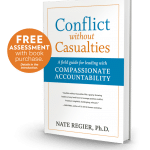
The Discipline Of Optimism
Share viaOptimism is not just seeing the glass as half full. It’s about doing what it takes to fill it up.
Optimism is not wishful thinking. Not even a hopeful attitude. Optimism is the discipline of envisioning and pursuing possibility, against the odds. Optimistic people are this way because they work at it.
To think bad thoughts is really the easiest thing in the world. If you leave your mind to itself it will spiral down into ever-increasing unhappiness. To think good thoughts, however, requires effort. This is one of the things that discipline training is all about. – James Clavell
Optimists don’t just see the glass as half full, they push through to keep filling it so that potential turns into reality. Optimism takes perseverance, grit, and belief in the power of a vision and of the people pursuing that vision. Optimism doesn’t give up when the going gets tough. Optimism never quits looking for opportunity, potential, the possibility everyone else missed, the faint light at the end of the tunnel.
Jon Gordon, an ambassador of positivity, wrote this about optimism.
“Now, more than ever, optimism is a competitive advantage. Bob Iger, the CEO of Disney, was asked the most important characteristic of a leader and he said “Optimism.” After all, it’s not the pessimists who will grow this economy. It’s the optimists who believe in a brighter future that will take the actions necessary to create it. Optimism will also help you navigate the set-backs, challenges, naysayers and Energy Vampires as you seek to grow your business. You have a choice. You can believe success is impossible or you can believe that with faith, hard work and an optimistic attitude all things are possible. To grow your business, choose the latter.” Read the full article here.
Tips for Developing Optimism
- Focus on what’s working: It’s human nature to dwell on what’s broken, missing, or didn’t work. Take time each day, with each project, to list and celebrate what is working or what went well. The more you do it, the better you will become.
- Overnight success is “A thousand problems solved.”: When asked about the magical success of the movie Toy Story, director John Lasseter recounted all the ways in which this movie was doomed from the start; an unlikable main character, the first fully animated motion picture, and the list goes on. They key to success, he shared, was that the team simply solved one problem after another, not focusing on the doom and gloom, but instead on each new problem to solve. When the going gets tough and the summit seems far away, this orientation is a great way to continue having small successes along the way.
- What could go wrong vs. What didn’t go wrong: Every year we exhibit and present at the Association for Talent Development international conference and expo. A few years ago instead of having our exhibit booth shipped via a national hauler, we did it ourselves to save money. We rented a Sprinter van, loaded up our stuff, and drove to Colorado. There were lots of things to worry about, like driving an unwieldy vehicle through urban traffic, in and out of tight parking garages, loading and unloading precious cargo, or where to park the beast. We solved most of these problems and picked up a few bumps and bruises along the way (one of them on the back bumper of the van when I got stuck in a parking garage!). On the way home we narrowly missed colliding with a car that had been rear-ended in the oncoming lane of traffic, careened across the median, rolled, and come to rest directly in front of us. We were the first ones on the scene and were able to help. Nobody was seriously injured. And it could have been a lot worse. As we’ve recounted our stories from this trip, we’ve realized that some things went wrong. And, some very big things that could have went wrong, didn’t. How do you want to remember your life? What went wrong, or what could have gone wrong that didn’t? I’d prefer to feel lucky rather than worried!
More great optimism tips from my friend and leadership expert Dan Rockwell. Here are 7 Ways to Avoid The Pitfalls of Optimism.
Anyone can be an optimist if they are willing to dedicate themselves to the discipline. It doesn’t happen by chance and it doesn’t come for free. The benefits are well worth it!
Copyright 2018, Next Element Consulting, LLC, All rights reserved
 Optimism is a fruit of Persistence, one of the three Compassion Skills described in my book, Conflict Without Casualties. With the book you can take the Drama Resilience Assessment for free to find out your drama risks and compassion potentials. In our Leading Out of Drama program, we help leaders develop and use all three compassion skills in order to build cultures of Compassionate Accountability.
Optimism is a fruit of Persistence, one of the three Compassion Skills described in my book, Conflict Without Casualties. With the book you can take the Drama Resilience Assessment for free to find out your drama risks and compassion potentials. In our Leading Out of Drama program, we help leaders develop and use all three compassion skills in order to build cultures of Compassionate Accountability.
Book Nate for a speaking engagement
Book Your Next Keynote Speaker

Author and Co-founder of Next Element, Dr. Nate Regier is available to speak at your upcoming event.
Submit a Speaker RequestPodcast: Listen to Nate "On Compassion"
 Listen to the Podcast
Listen to the Podcast



3 Comments
Another fabulous blog, Nate! Very timely for me this week. Thanks so much for your optimistic insight! GREAT for a Friday!
Thanks Jerrie! Great to hear from you.
Add comment
Add comment
Nate,
Thanks for this reminder! Your work always hits the nail on the head! (sometimes mine!)
Add comment
The man shot in a robbery is conscious but critical. The staff’s faces showed they thought he was a dead man, and he saw it. So, he decided to take action. When the nurse asked him if there was anything he was allergic to he said “Yes.” took a deep breath and said, “Bullets.”
He told them to operate on him like he was going to live, but he had decided to live. Took 18 hours of surgery and lots of rehab, but even in that situation, he lead with optimism.
That’s a great story Sue Ann!
Add comment
Add comment
Add comment